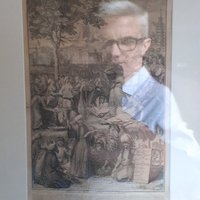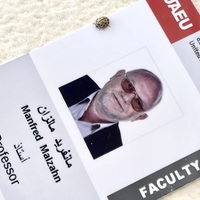Conference Presentations by Annie Demosthenous

Subversion and Stereotype in 'To Kafe tis Haras': Homosexuality and Greek Identity
This paper analyses the representation of difference through the subversion of stereotypes and mo... more This paper analyses the representation of difference through the subversion of stereotypes and mockery of tradition in Το Καφέ της Χαράς (Hara’s Café), an eighty-eight episode comedy TV series screened on ANT1 between 2003 and 2006. Hara (Joy), a young Athenian advertising executive and single mother, loses her job and is forced to take up an unexpected inheritance of a shop and house in the fictional village of Kolokotronitsi, which she sees as unimaginably remote and backward. There she meets her nemesis, Periandros Popotas, village mayor, historical and folklore scholar and self-proclaimed traditionalist, who announces immediately before her arrival that he intends to take Kolokotronitsi a hundred years into the past to save the villagers from the decadence and dehumanising influences of modernity. Consequently, he sees Hara as the incarnation of all he opposes. The series can be read as an extended debate between Hara and Popotas about what it should mean to be Greek; their attempts to understand each other’s position once they fall in love suggest the potential for a rapprochement between traditionalist Greek values and progressive international values, represented by Popotas and Hara respectively. However, ultimately the experiment is unsuccessful. In the final episode, Hara returns to Athens alone, because Periandros, and by extension his village and the nation it symbolises, cannot change. Hara’s Café is often progressive, feminist and inclusive, but is not consistently so. The seriesuses stereotype to mock entrenched traditionalist attitudes and various types of chauvinism, including misogyny, homophobia and xenophobia. However, the use of stereotype often reinforces social norms rather than challenging them. This paper focuses on the treatment of homosexuality through a close-reading of Asteris’ ‘coming-out’ story arc in season 2. While the creators start out with the intention of challenging social norms and normalising identities seen as degenerate in mainstream Greek society, this attempt is largely unsuccessful, as subversive and inclusive statements are repeatedly undermined by the repetition of erroneous stereotypical assumptions about homosexuality.
Ithaka or Hame: Translations of Cavafy Into Scots
The Spectre of the Nation in the Work of Kyriakos Charalambides
Homer’s Sea of Monsters: Charalambides, Seferis and the Mediterranean Foundations of a Pan-Hellenic Identity
Presented at the Mediterranean Topographies Symposium at the University of Michigan, Ann Arbor in... more Presented at the Mediterranean Topographies Symposium at the University of Michigan, Ann Arbor in 2011, this paper analysed the significance of the sea in narratives of Greek identity in poetry by Kyriakos Charalambides and George Seferis.
Archaeology, myth and identity in Kyriakos Charalambides and George Seferis
Presented at the Society of Modern Greek Studies Graduate Research Colloquium held at King's Coll... more Presented at the Society of Modern Greek Studies Graduate Research Colloquium held at King's College London in 2011, this presentation focused on the archaeological poetry of Kyriakos Charalambides, comparing and contrasting it to George Seferis' treatment of archaeological sites in his poetry, and analyzing the significance of archaeological sites in the expression of Greek cultural identity in Cyprus.
Edwin Morgan, Kostas Montis: (Re)inventing the nation for a new century
Presented at the Society of Modern Greek Studies Graduate Research Colloquium held at Birmingham ... more Presented at the Society of Modern Greek Studies Graduate Research Colloquium held at Birmingham University in 2010, this presentation examined Kostas Montis' and Edwin Morgans' search for poetic identities and modes of writing which reflected the contemporary realities of Cyprus and Scotland respectively.
Becoming the Bard: Robert Burns, Vasilis Michailidis, and the Conception of the National Poet
Talks by Annie Demosthenous
Lost Cities: Kyrenia and Famagusta in Cypriot-Greek Poetry
Composing the Poetic: Elytis, Theodorakis and 'The Axion Esti'
Imagining National Landscape: Poetry and Film
Teaching Documents by Annie Demosthenous
The First World War broke out at a time when active military service was considered to be the dut... more The First World War broke out at a time when active military service was considered to be the duty of the aristocracy and upper middle-class in England. However, the so-called ‘Great War’ was different in both nature and in scale from previous conflicts, with a devastatingly high death rate among soldiers, and particularly young officers. Consequently, it fundamentally disrupted established narratives of war in British culture. Attitudes towards the War, but also towards the cultural and moral value of war in general, evolved alongside the changing nature of warfare. This was reflected in the literature written at the time.
This course will focus on the effects of the First World War on poetry.
Papers by Annie Demosthenous
Terry Pratchett, Jane Austen and the Definition of Literature
Jonathan Jones, an art critic for the Guardian newspaper, argued in a piece published on the 31st... more Jonathan Jones, an art critic for the Guardian newspaper, argued in a piece published on the 31st of August 2015 that Terry Pratchett's books are not literature, and therefore are not reading; instead, he claims one should spend one's time on 'real' literary works, like Jane Austen's novels. This article argues that Terry Pratchett and Jane Austen actually have a great deal in common, and that the boundaries of 'Literature' are more porous than Jones would have us believe.











Uploads
Conference Presentations by Annie Demosthenous
Talks by Annie Demosthenous
Teaching Documents by Annie Demosthenous
This course will focus on the effects of the First World War on poetry.
Papers by Annie Demosthenous
This course will focus on the effects of the First World War on poetry.